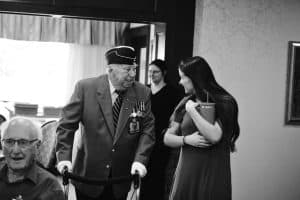On Remembrance Day, as a nation we take a few moments for recognition and reflection. To remember the courage and read more
On Remembrance Day, as a nation we take a few moments for recognition and reflection. To remember the courage and sacrifice of those who served their country and acknowledge our responsibility to maintain the peace they fought hard to achieve.
For many of us, war is a phenomenon seen through the lens of a television camera or a journalist’s account. It is something that feels distant or long ago; but for older adults, war touched and changed their lives. Many seniors served in the military and many more have memories of growing up during times of conflict.
Each year, All Seniors Care Living Centres pay tribute to members of the Canadian Armed Forces and RCMP who have served and continue to serve our country today.
Why Do We Observe Remembrance Day?
 Remembrance Day was first observed in 1919 throughout the British Commonwealth. It was originally called “Armistice Day” to commemorate the armistice agreement that ended the First World War on Monday, November 11, 1918, at 11 a.m.—on the eleventh hour of the eleventh day of the eleventh month.
Remembrance Day was first observed in 1919 throughout the British Commonwealth. It was originally called “Armistice Day” to commemorate the armistice agreement that ended the First World War on Monday, November 11, 1918, at 11 a.m.—on the eleventh hour of the eleventh day of the eleventh month.
In 1931, the House of Commons changed the name to Remembrance Day. Since then, every year on November 11, Canadians pause for 2 minutes of silence to honour and remember the men and women who served, and continue to serve, Canada during times of war, conflict, and peace. We remember to give their sacrifice meaning.
These Acts of Remembrance also provide:
Respect for Veterans:
ASC retirement residences are home to veterans and their close family members. Remembrance Day is a particularly significant occasion for these individuals, as it acknowledges their sacrifices and the sacrifices of their fallen comrades. Participating in Remembrance Day activities and wearing a poppy can show them that their service is remembered and appreciated.
Preservation of History:
Many residents have lived through wartime or have had family members affected by conflicts. Recognizing Remembrance Day helps to keep these historical memories alive, ensuring that the lessons and stories from the past are not forgotten.
A Sense of Community and Solidarity:
Commemorating this day can foster a sense of community within the residence as individuals come together to honor those who have served. It creates an opportunity for people to share stories, support each other, and feel a collective sense of pride and solemnity.
Educational Opportunities:
For younger generations, including staff and visitors, Remembrance Day activities can serve as an educational experience. They offer a chance to learn from the firsthand accounts of residents about the realities of war and the importance of peace.
Encourage Gratitude:
Remembrance services can inspire feelings of gratitude as both veterans and non-veterans reflect on the peace and freedoms we enjoy, which were secured through the efforts and sacrifices of others.
15 Ways to Honour Remembrance Day
 On November 11th, many residences invite families and the public to join us for remembrance services, music, and laying of wreaths. For those who are not able to attend our services, here are some activities inspired by All Seniors Care retirement homes in Quebec, Ontario, Manitoba, Saskatchewan, and Alberta
On November 11th, many residences invite families and the public to join us for remembrance services, music, and laying of wreaths. For those who are not able to attend our services, here are some activities inspired by All Seniors Care retirement homes in Quebec, Ontario, Manitoba, Saskatchewan, and Alberta
 Remembrance Garden: If the facility has outdoor space, consider planting a remembrance garden with poppies and other flowers as a lasting tribute.
Intergenerational Projects: Involve local schools or youth groups in activities such as making thank-you cards for veterans, which can be distributed to the residents.
Memorial Service Broadcast: For those unable to attend ceremonies, set up a viewing area where residents can watch national or provincial Remembrance Day services on television or online.
Memory Book: Compile a memory book with pictures and stories from older adults, particularly focusing on their experiences related to military service or life during wartime.
Remembrance Garden: If the facility has outdoor space, consider planting a remembrance garden with poppies and other flowers as a lasting tribute.
Intergenerational Projects: Involve local schools or youth groups in activities such as making thank-you cards for veterans, which can be distributed to the residents.
Memorial Service Broadcast: For those unable to attend ceremonies, set up a viewing area where residents can watch national or provincial Remembrance Day services on television or online.
Memory Book: Compile a memory book with pictures and stories from older adults, particularly focusing on their experiences related to military service or life during wartime.
It’s important to be sensitive to the fact that this day can evoke strong emotions and potentially difficult memories for some individuals. Activities should be inclusive and designed to honor and remember without causing distress. It’s also beneficial to have support available for any seniors who may find the day challenging.
Most importantly, this Saturday, take a moment to reflect on the freedoms and peace in your life, and to remember the men and women who served and sacrificed for all we have today.
At All Seniors Care, we put the effort in to acknowledging special occasions, including Remembrance Day. We do this to create a supportive, respectful, and engaging environment for our residents. If you’re interested in joining one of our senior living communities, click here explore our locations.













